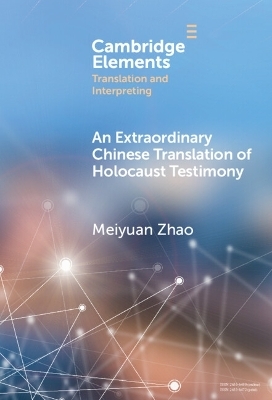
An Extraordinary Chinese Translation of Holocaust Testimony
Seiten
2024
Cambridge University Press (Verlag)
978-1-009-54986-8 (ISBN)
Cambridge University Press (Verlag)
978-1-009-54986-8 (ISBN)
This Element explores the translation of Holocaust testimonies into Chinese by Gao Shan, an unconventional approach with significant alterations to the original texts. Drawing on sociology, memory studies, and sociolinguistics, it shows ethical concerns and the sacrifices to make the survivors' experiences accessible to a non-acquainted audience.
This Element focuses on two Holocaust testimonies translated into Chinese by translator, Gao Shan. They deserve attention for the highly unorthodox approach Gao adopted and the substantial alterations he made to the original texts. The study begins by narrating the circumstances that led to these translations, then goes on to explore Gao's views on translation, his style, additions to the original accounts, and the affective dynamics of his translation activity. The author draws on concepts from sociology, memory studies, and sociolinguistics to frame the discussion and highlight the ethical concerns inevitably involved in Gao's work. Without minimizing the moral responsibility of faithful transmission that Holocaust material should always impose, the author wants to show how Gao sometimes sacrifices strict accuracy in his desire to make the survivors' experiences intelligible to a prospective audience wholly unacquainted with the Holocaust.
This Element focuses on two Holocaust testimonies translated into Chinese by translator, Gao Shan. They deserve attention for the highly unorthodox approach Gao adopted and the substantial alterations he made to the original texts. The study begins by narrating the circumstances that led to these translations, then goes on to explore Gao's views on translation, his style, additions to the original accounts, and the affective dynamics of his translation activity. The author draws on concepts from sociology, memory studies, and sociolinguistics to frame the discussion and highlight the ethical concerns inevitably involved in Gao's work. Without minimizing the moral responsibility of faithful transmission that Holocaust material should always impose, the author wants to show how Gao sometimes sacrifices strict accuracy in his desire to make the survivors' experiences intelligible to a prospective audience wholly unacquainted with the Holocaust.
Introduction; 1. Story: two authors, one translator; 2. Footing: Gao's views on translation; 3. Style: readability and elegance; 4. Presence: the translator as secondary witness; 5. Affect: the translator's stance in a triangle model; Conclusion: Out of the ordinary; References.
| Erscheint lt. Verlag | 31.12.2024 |
|---|---|
| Reihe/Serie | Elements in Translation and Interpreting |
| Zusatzinfo | Worked examples or Exercises |
| Verlagsort | Cambridge |
| Sprache | englisch |
| Themenwelt | Geschichte ► Allgemeine Geschichte ► 1918 bis 1945 |
| Geisteswissenschaften ► Sprach- / Literaturwissenschaft ► Sprachwissenschaft | |
| ISBN-10 | 1-009-54986-3 / 1009549863 |
| ISBN-13 | 978-1-009-54986-8 / 9781009549868 |
| Zustand | Neuware |
| Informationen gemäß Produktsicherheitsverordnung (GPSR) | |
| Haben Sie eine Frage zum Produkt? |
Mehr entdecken
aus dem Bereich
aus dem Bereich
ein Psychologe erlebt das Konzentrationslager
Buch | Hardcover (2024)
Kösel (Verlag)
22,00 €
Mythos „Stauffenberg-Attentat“ – wie der 20. Juli 1944 verklärt und …
Buch | Hardcover (2024)
Goldmann (Verlag)
24,00 €


